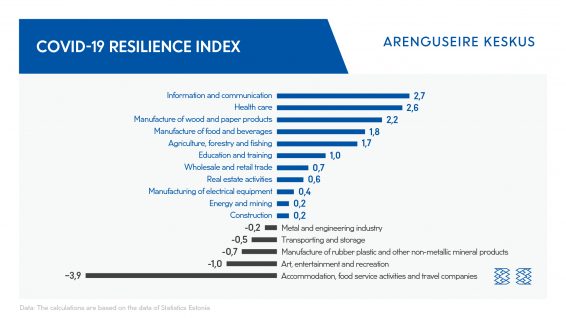Is the Estonian economy ready for the second wave of the coronavirus?
In Estonia, the information technology and communications sector was the least hit by the first wave of the coronavirus in spring, while accommodation providers, caterers and travel agents found themselves in the most difficult situation, the Foresight Centre report “The Impact of Virus Crisis on the Estonian Economy” shows.

“The Estonian economy is entering the second wave of the coronavirus in a relatively vulnerable state,” expert of the Foresight Centre Uku Varblane said. “Several economic sectors used up their reserves, waiting for the situation to improve, and therefore dealing with the second wave is more complicated for them,” he added.
Varblane noted that, in several sectors, companies had postponed investments and R&D activities, and this was having a negative effect on other, related industries. “As companies in certain sectors are directly affected by the increased virus threat, it may bring along a change in our economic structure in the coming years – more virus-proof sectors will manage better,” Uku Varblane explained. “The more vulnerable sectors create 14% of the added value and employ 21.2%, or at least every fifth worker in Estonia.”
The COVID-19 resilience index developed by the Foresight Centre finds that of the 17 economic sectors, the companies of the information and telecommunications sector, health care sector and forestry and wood industry have held up the best in the crisis. “In the coming years, the Estonian economy will probably rely more on these more virus-proof sectors,” Uku Varblane said. The companies of accommodation and catering, as well as the entertainment business, have suffered the most in the virus crisis.
The COVID-19 resilience index measures the extent to which economic sectors are affected by the coronavirus crisis. The index is based on various economic indicators of companies.
The value of the index is between -5 (the largest negative impact) and +5 (the smallest negative impact). Changes to the turnover of companies (total turnover for March–August 2020 in comparison to the same period of the previous year) carry the most weight in the index, besides that, the changes in the number of employees in comparison to the same period in 2019 and the dynamics following the spring emergency situation are taken into account. Changes in labour expenses, and in profit and investments of companies in comparison to the same period last year also have a role in the calculation of the index. Additionally, the development dynamics of sectors have been affected by long-term trends, such as the increase in technology-intensity.

The Foresight Centre starts publishing surveys of the impact of the virus crisis on economic sectors on 17 November. The Foresight Centre will present the scenarios for exiting the virus crisis at the beginning of December.
The report “The Impact of the Virus Crisis on the Estonian Economy ” explains the possible meaning of trends that have arisen with the virus crisis and of the emerging uncertain factors on the competitiveness of Estonian companies and on the development of the economic environment in the wider context. Read more here.
Foresight Centre is a think tank at the Chancellery of the Riigikogu that analyses long-term developments in society and the economy. The Centre conducts research projects to analyse the long-term developments in Estonian society, and to discover new trends and development directions.
Latest news
-
27.06 2025Current low birth rate will lead to up to 1.3 billion euros less tax revenue in the future
In its new short report “The impact of population ageing and low birth rate on long-term state revenue and expenditure”, the Foresight Centre notes that the lower than projected birth rate will reduce government spending on family policy and education, but in the long term, it will mean up to 1.3 billion euros less in tax revenue.

 An independent think tank at the Riigikogu
An independent think tank at the Riigikogu 